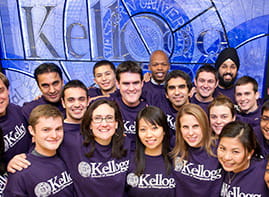Kellogg professors are using blogs and other new media tools to share insights and research well beyond the classroom
12/22/2009 -
David Dranove turned his television set to C-SPAN one day in late October, expecting to watch a Senate hearing on the link between medical debate and bankruptcy.
And then the Kellogg professor heard himself being quoted by a United States senator.
"'Harvard studies are so poorly designed that it is impossible to tell from their work just how serious the problem is,'" Alabama Sen. Jeff Sessions said, reading from Dranove's blog,
Code Red.
"'And the conclusion that private health insurance does not protect against bankruptcy appears to be totally misguided. Even worse, the Harvard studies are leading to bad policy. … I have said it before: It is vitally important that academics get the numbers right.'"
Reflecting on the event, Dranove, the Walter J. McNerney Professor of Health Industry Management, says: "It was cool that my blog was shaping thought leaders."
Dranove, who launched his blog in 2007 with Cornell University Professor William White, is among a growing number of Kellogg professors using new media tools to take classroom debate far beyond the walls of academia. Outlets like podcasts, blogs, Facebook and Twitter allow professors to share their insights not only with students and fellow researchers, but with alumni, the media and the greater business community.
The audience for these efforts is growing. Margaret Douglas '95, director of Web marketing and new media, notes that the primary Kellogg group on LinkedIn now has 13,000 members. On Twitter, the @KelloggSchool account has more than 1,500 followers who receive daily information about Kellogg research, events and alumni in the news.
Kellogg is working to leverage these outlets to build the brand of the school and to connect with individuals beyond its typical stakeholders, Douglas says.
"The reality is that faculty research has broader implications outside of Kellogg," she says. "Our professors are expanding the context of that research and providing valuable information to a larger audience."
Insights from every corner Dranove and other faculty bloggers are fulfilling a key part of Kellogg's mission to disseminate knowledge, says
Patricia Ledesma, assistant dean and director of the school's Office of Research. A central component of that effort is Kellogg Insight, an online showcase of faculty research.
Launched in 2007, the monthly e-publication is geared toward an educated, non-academic audience. The
Kellogg Insight Web page includes video and podcasts of professors sharing the reasoning behind their research and answering questions posed by their work.
All these outlets bridge the gap between academic research and the nuts-and-bolts world of management, and demonstrate how faculty findings can be put to use in an immediate and practical way.
"At the end of the day, our research doesn't really matter if it doesn't change the way the world works," Dranove says. "We can have influence by influencing other researchers, but that cycle has to end with something being translated into practice."
Theory and practice When
Brayden King, assistant professor of management and organizations, helped create
Orgtheory.net, he initially thought the blog would be a good forum for theoretical discussions with his colleagues at other universities.
"We are kind of like those kids who hang out in vinyl record stores talking about music. But instead of music, we're talking about theory," King says.
But to his surprise, the blog has drawn readers from well beyond academia, including lawyers, policymakers and former students. It has even inspired a Facebook fan page with about 200 followers.
King and the other bloggers who contribute to
Orgtheory.net serve up a variety of topics to discuss, from conferences and papers to Nobel Prize winners and healthcare reform. King himself posted his fall syllabus for a Kellogg doctoral-level course and asked readers for their feedback. They urged him to add certain case studies, books and additional subject matter. "Note to self: Posting a syllabus is a great way to get information about people's mental maps of the field," King wrote on the blog. "It's a fun and useful exercise."
Tim Calkins, clinical professor of marketing, would agree. He started his blog,
Building Strong Brands, as a complement to his marketing strategy course. Recent blog topics have included Southwest Airlines' luggage policy and the U.S. government's "Cash for Clunkers" automotive program. Calkins also oversees a
seasonal blog about Super Bowl advertising with
Derek Rucker, the Richard M. Clewett Research Professor. The day after the 2009 Super Bowl, the site received more than 2,000 unique visits.
"It keeps students engaged, enhances the learning experience and connects the theories they've been learning in class to the real world," Calkins says. "Also, the blog doesn't end when the class ends. In theory, students could follow the discussion for as long as they want."
A new audience Shane Greenstein's blog,
Virulent Word of Mouse, has attracted a following of nearly 4,000 since its launch in June. The blog — a companion to Greenstein's column for IEEE Micro magazine — showcases the professor's observations on online behavior, Internet economics, communications policy and broadband.
Greenstein's readers include policymakers with questions about his research or his take on policies and proposals. "They don't want to take the time to sort through a column, but they are happy to go to a blog," says Greenstein, the Elinor and H. Wendell Hobbs Professor of Management and Strategy. "That's the norm now, so I'm tapping into that. Blogs fit into a niche that other mediums don't cover. They are immediate and they keep you current."
King notes that blogs offer another bonus to faculty members who have adopted the medium: They are a creative outlet and an opportunity to express one's views in an inventive way.
"Academics, we love what we do, we love to talk about things we study and we love to learn about other things," King says. "There are very few forms in which you can do this — where you can intermingle the work with the play."






